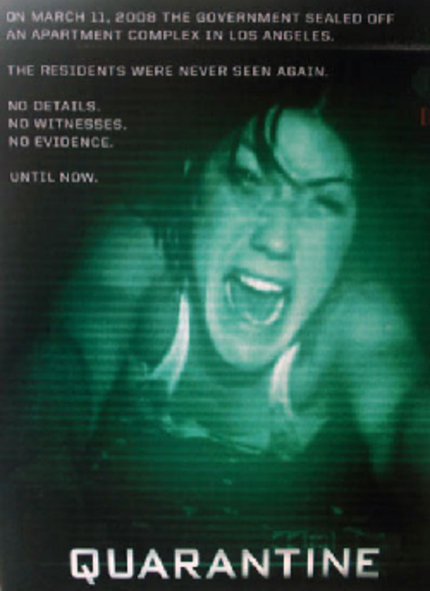Review: QUARANTINE

Not as bad as might have been feared, American remake Quarantine delivers on the blood and guts while falling short on the nerve-jangling tension served up by [REC], the Spanish original. Given the current US theatrical horror climate, though, it's refreshing to see a genuine R-rated thriller that goes for the jugular, even if it doesn't entirely succeed.
The premise remains the same: television reporter Angela Vidal (Jennifer Carpenter) and her cameraman Scott (Steve Harris) plan to spend a normal shift with a firefighting crew for a feature story. After observing the men in the fire station, they accompany the crew on what should be a routine call to an apartment building. The call quickly turns into a night of deadly terror. The entire story is told from the point of view of the cameraman.
If you haven't seen the original, Quarantine offers several sharp jolts and creates an atmosphere with a fair amount of dread. The opening scenes establish Angela as a perky, good-natured, down to earth young woman. She jokes easily with the all-male crew, goes along when they invite her into the steamy locker room, and joins in when they play basketball. Once they've on the scene and all hell starts to break loose, she demonstrates a great -- though not unlimited -- amount of steely resolve in the face of grave obstacles.
Jennifer Carpenter has done excellent work in the TV series Dexter as the profane younger sister of the titular serial killer, and her performance as Angela goes a long way toward generating sympathy for what's happening to the rather hapless people ultimately trapped in the apartment building.
Director John Erick Dowdle and his brother Drew Dowdle reportedly wrote their adaptation based solely on the original trailer and script by Jaume Balagueró, Luis Berdejo, and Paco Plaza. The script retains the same structure, but plays around with the details and the tone of certain sequences, nearly always to their detriment.
For example, the opening scenes in [REC] are quieter and more low-key, which have the effect of lulling the viewer while waiting for the horror to begin. Of course, we know something bad is about to happen, but the waiting casts its own spell of distraction, and lends shocking immediacy to what follows. Quarantine makes the firehouse set-up a series of jaunty episodes, keeping the eyes and senses fully occupied. When the horror starts, it's not as much of a jolt.
Quarantine adds several grisly notes, which should please hard-core horror fans, and introduces at least one way over-the-top method of death, which deserves notice and will no doubt be imitated in the future (unless this movie is ripping off another before it, that is). The Dowdle brothers also decided to make the cause of death more grounded in plausible reality. Actually, that so-called "reality" approach doesn't work any better than the original's; it's just different.
Commendably, Quarantine does imitate the original by refraining from spending too much time on explanations, which only slow things down.
The overriding problem with Quarantine is the decision to make the POV that of an amateur videographer. Thus, we're subjected to an entire movie's worth of the dreaded "shaky cam," complete with constantly-moving, jittering movements and nauseating whip pans.
I was seasick before the crew ever arrives at the apartment building, and this points to the fallacy of Dowdle's approach: This particular cameraman is supposed to be a professional cameraman. Unlike the kids in The Blair Witch Project and the thousand that followed, cameraman Scott is experienced at shooting with a heavy, professional-quality camera on his shoulder; he knows how to compose a shot, he knows how to pan the camera quickly, but not too quickly, without making the viewer (or his producer) sick, he's accustomed to walking around and following a reporter and interview subjects as they move unexpectedly. After all, he's a professional!
[REC] succeeds in part because directors Jaume Balagueró and Paco Plaza allow moments in which the eyes and senses can rest, enabling the viewer to take a breath before the hysteria resumes. This is especially true in the early scenes in the fire station, and also during a sequence in the apartment building. They're also smart enough to frame things so that when certain characters are in peril -- or under attack -- we can see who it is and what's at stake.
The Quartine filmmakers are so intent on presenting a "reality show" approach that they ignore the aesthetics of reality shows, which, yes, are mostly shot by handheld cameras, but rarely induce nausea. Even if you have a much greater tolerance for the "shaky cam" approach than I do, forget about recognizing apartment residents or the firefighters at key moments.
If you're dead set against reading sub-titles, Quarantine can be recommended as better than most all the J-horror remakes by American studios that have been released. Just keep in mind that it borrows nearly all of its best moments from the original.
Speaking of the original, I saw it on the two-disk Region 2 edition that Ard Vijn reviewed in detail recently, and I definitely concur that it's worth a purchase.







